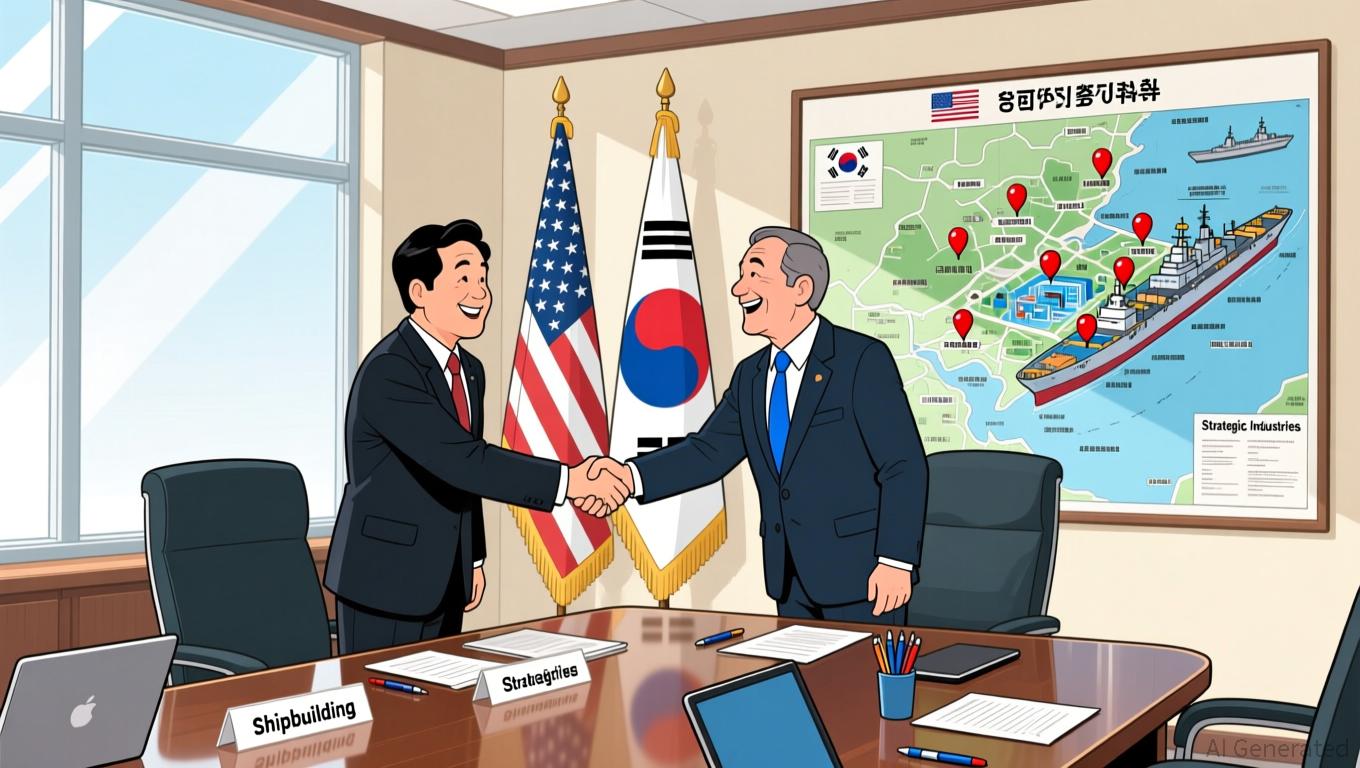US-South Korea $350 Billion Agreement Seeks to Bolster Economic Stability and Address China’s Influence
- US and South Korea finalize $350B economic-security pact to counter China, boost resilience. - Includes $150B in US shipbuilding, $200B strategic investments, and 232 tariff cuts on autos, parts, lumber, and pharmaceuticals. - Authorizes Seoul to build nuclear submarines, expands uranium enrichment collaboration, and commits $25B in US military purchases by 2030. - South Korea pledges 3.5% GDP defense spending, US provides $33B troop support; EV subsidies to offset US tariff impacts on automakers .
The United States and South Korea have reached a historic agreement that redefines their economic and security partnership. Announced on November 14, the accord features a $350 billion commitment from South Korea to invest in American industries, major tariff cuts, and enhanced defense ties, including permission for Seoul to develop nuclear-powered submarines.
A central element of the agreement is South Korea’s pledge to invest $150 billion in the U.S. shipbuilding industry, with an additional $200 billion allocated to “strategic investments” in various sectors.

The two countries have also broadened their defense collaboration. South Korea has obtained U.S. consent to build nuclear-powered attack submarines, fulfilling a long-term strategic ambition. Furthermore, both sides agreed to
President Lee Jae Myung of South Korea stressed that the investments would target commercially sound ventures, addressing local worries about potential financial risks. “Trade and security talks have now officially wrapped up,” Lee said,
At the same time, South Korea is taking steps to mitigate the effects of U.S. tariffs on its automotive sector. The government intends to increase subsidies for electric vehicles by more than 30% and introduce incentives for trading in older cars to encourage EV purchases domestically. These policies are designed to ease the financial burden on companies like Hyundai and Kia, which
This agreement is part of a broader strategy to boost economic stability in the face of international competition, especially from China. South Korea’s $350 billion investment initiative is projected to generate jobs and strengthen U.S. manufacturing, while tariff reductions are expected to enhance the competitiveness of South Korean exports. The deal also supports U.S. efforts to secure supply chains and counter China’s regional influence.
Disclaimer: The content of this article solely reflects the author's opinion and does not represent the platform in any capacity. This article is not intended to serve as a reference for making investment decisions.
You may also like
YFI has dropped 41.08% over the past year, experiencing fluctuating short-term movements.
- YFI fell 0.02% in 24 hours, 5.94% weekly, but rose 0.04% monthly amid 41.08% annual decline. - Price swings reflect mixed short-term stability and long-term fragility driven by macroeconomic factors. - Backtesting showed -2.15% average return post-41.08% annual drops, with no abnormal gains detected. - Market dynamics suggest prolonged consolidation rather than isolated events caused the sustained decline.
Solana News Today: Solana ETFs Signal Crypto's Move Into the Mainstream, Surpassing Bitcoin
- VanEck files Form 8-A for its Solana spot ETF (VSOL), signaling imminent Nasdaq launch after October S-1 registration. - 10 Solana ETFs await SEC approval as institutional demand grows for regulated access to the blockchain's ecosystem expansion in DeFi, NFTs, and staking. - Bitwise's first Solana ETF attracted $420M in its debut week, forcing competitors to accelerate strategies amid evolving regulatory pathways. - Strong institutional inflows ($421M in November) pushed SOL toward $168, though volatilit
ALGO experienced a 16.57% quarter-over-quarter decline due to product transitions and fluctuations in the market.
- ALGO fell 16.57% QoQ amid market volatility and product transition challenges at Alargo. - Alargo replaced Akaroid with NHD, achieving 80% YoY sales growth through direct doctor engagement. - AXI's margin optimization doubled contribution per piece despite 60% volume decline from low-margin delistings. - ARCO Pharma's rebranding and scientific training aims to strengthen pharmacist relationships and market position. - Analysts note long-term margin potential but warn of short-term revenue risks from tran
BCH Drops 1.35% Today as Loan Expansion Slows and Profitability Faces Challenges
- BCH fell 1.35% in 24 hours amid weak loan growth and reduced inflation adjustment income, with 60% revenue tied to net interest income. - Institutional holdings rose 12.75% but shares held dropped 3.53%, as Bridge Builder increased exposure while Baillie Gifford cut holdings by 289.93%. - Goldman Sachs maintains Neutral rating with 0.70% upside, while backtesting shows mixed post-earnings performance with limited statistical significance from two data points.